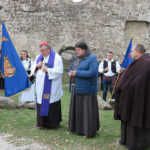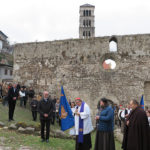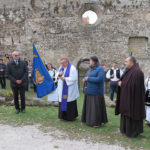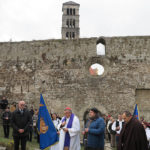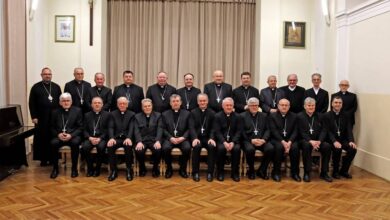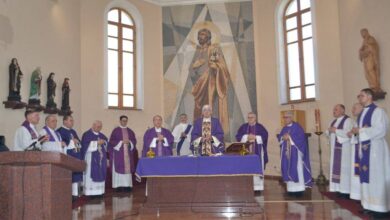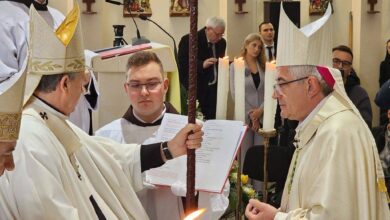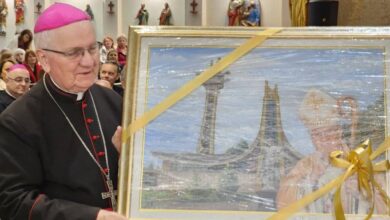CELEBRATION OF 557TH ANNIVERSARY OF CORONATION OF KING STJEPAN TOMAŠEVIĆ
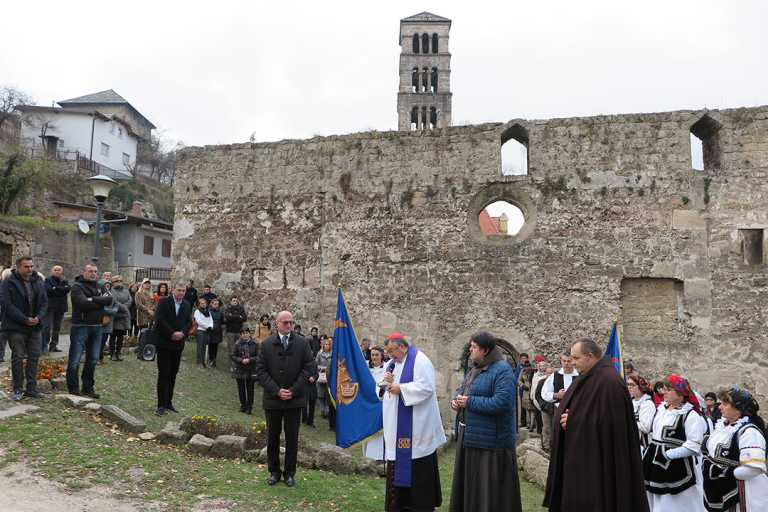
Celebration of 557th anniversary of coronation of King Stjepan Tomašević took place on November 17th in Jajce.
A congratulatory celebration in the parish church of the Assumption of the Blessed Virgin Mary was led by the Archbishop of Vrhbosna Vinko cardinal Puljić. Liturgical singing was led by the parish choir under the guidance and with the harmonic accompaniment of sister Dubravka Dropulja.
The gathering of the participants of the celebration began at the church of St. Mary, where in the name of the organizers: the Agency for Cultural Heritage, Natural Heritage and Development of the Tourist Potential of the City of Jajce, the House of Culture of Jajce and the Association of Stjepan Tomašević Jajce, Mr. Anto Brtan, greeted Cardinal Puljić, other guests and people of Jajce and Pougarje, and reviewed the resume of King Stjepan Tomašević and the history of that anniversary. He pointed out the evil destiny and the current problem of the church of St. Mary and the tower of St. Luke, which are protected national cultural monument of the first category of BiH.
“On today’s day, in 1461., in the church of St. Mary, beside which we stand, last Bosnian king Stjepan Tomašević was crowned. Crown ceremony was led by papal envoy Nikola Modruški and royal crown sent by Pope Pius II. to Jajce was brought by the bishop of Nin, Božo. By this act, Pope Pius II. acknowledged Bosnian independence”, Brtan said.
He reminded that by the king’s wish, Pope Pius II. proclaimed St. Gregory The Miracle Worker Protector of the Bosnian Kingdom and the Church of St. Mary proclaimed a forgiving church to all the believers who visited for Mary’s feast days. “No pope after him has withdrawn this decision about the proclamation of the church of St. Mary a forgiving church, in whose tower, between 1459. and 1463., they guarded the powers of St. Luke the Evangelist, for whom the tower was named. The Ottomans turned St. Mary’s church into the Fethia mosque, that is, the Sultan Sulejman’s mosque in 1528. The Austro-Hungarian authorities have already proclaimed it a monument of culture in 1892. I think we will all agree on the importance of this national monument for our cultural and historical heritage. It’s every stone sends cries, as well as the bones of our distant ancestors that stem from open graves. We all say that something has to be done urgently to prevent its further decay but we are not taking any concrete action. We are aware of the need for big money, which is always lacking, but first of all, the will is needed to deal with some things”, Brtan said.
He pointed out that today, the church of St. Mary, or Fethia mosque, becomes the source of disagreement between Bosniaks and Croats in Jajce. “It was a coronation church. Then, with the arrival of the Ottomans, it was converted into a mosque, and for that purpose it served until the fire in 1832. in which it was destroyed. But today is just a ruin that will collapse even more if nothing is done. That is why we hereby appeal to religious communities and its leaders to try to find a long-term solution so that the burden of this problem would not fall only on the backs of local religious and secular authorities, and that it would not be the seed of divisions among us in the future”, Brtan said.
“I want to share this memory we have heard now, to remember and know where we stand. I came to express the respect of the past and awaken the memory of the present, in order to convey it to future generations. My presence here is with the blessing of Banja Luka’s Bishop, Franjo Komarica, who has written to me to come here because he was not able to come. Here I come with special feelings because I am the son of this diocese. I am coming to share with you the communion and the same feelings of respect and awareness of our past”, the cardinal said, saying that we should remember the roots from which we nicked. “And there is no need to go to conflict, but to respect the facts, respect the roots, respect what is sacred. For us Catholics, the place of the church is a particularly sacred place, for we have heard that this church is endowed with special forgiveness. That is why we want to take in consideration the religious aspect as well as historical and national. It is true that every war has its own legitimacy. We no longer need war. Now we need to build peace, coexistence, understanding and respect. That is why we want to respect our past and the dead who were buried here”, the cardinal said.
When we are talking about the land of Bosnia and Herzegovina, he reminded us, we must not forget the reality that the pope acknowledged that land as an independent, giving the crown to the king. “And this is exactly what we need to be encouraged today to respect this past, because then Bosnia and Herzegovina was recognized by papal sending of crowning King Stjepan. In that spirit we will be praying for all the dead of our past, starting with King Stjepan who was executed, but also for all those whose graves were here”, Archbishop Puljić said.
After praying for the dead, all present went to the parish church of the Assumption of the BVM, in which cardinals, priests and numerous believers of Jajce and Pougarje, as well as their guests, were welcomed by the parish priest of Jajce, the Guardian and dean OFM Anto Šimunović.
Cardinal Puljić thanked the Guardian Šimunović and welcomed the priests and the present believers, pointing out that the present parish church of the Assumption of BDM in Jajce is the successor to the forgiveness assigned to the church of St. Mary. “Today we mark the anniversary of the coronation of King Stjepan Tomašević. But we have to understand that, through that crown, when a Pope gives a crown to a king at that time, he recognizes that land as independent. Today is different when one country needs to be recognized as a state. It
depends on the recognition of other states. You know how this recognition depends today. How many countries acknowledge a country, that much is it recognized in the world. At that time, a country was not recognized by other countries. A country was acknowledged as independent by Pope crowning their king. And thus, Bosnia became publicly recognized by the crowning of King Stjepan. But, with that crown in the church of St. Mary, where King Stjepan was crowned, Pope Pius II. gave a special document of forgiveness; to have special forgiveness in that church on Mary’s feast days. Today, these forgiveness days happen on special feast days like All Saints day or Soul’s day. As we have heard at the church of St. Mary this papal decision has never been revoked”, the cardinal said, and then clarified what this means when the Church forgives.
The Cardinal mentioned three important marks that Croats had in history. The first is devotion to the Mother of God. “Throughout our history, especially when it was most difficult for us, when our torturers persecuted us, it is interesting that our people at that time especially prayed to the Mother of God and built for her venerable churches and chapels. Each house had a picture of Our Lady. Somehow they felt that Mary was our patron. With godly devotion to Mary, the special mark of the devotion of our people was devotion to the cross. The cross, especially in those Ottoman times, meant that we were Christians. Where it was possible, the Cross was placed at the front door, on the houses, and women marked their arms with it. Let it be known at their moment of death that they are Christians. The cross was the content of life. For Jesus said, ‘Whoever wants to go after me, let him take his cross and follow me’. Our people realized that the cross is a sign of our dignity. A man, when he loses consciousness of his dignity, is enough to look at the cross: I am this worthy. The death of Jesus Christ shows my value. It is the dignity of the child of God. The third thing that marked our history is the connection to the Pope. Here, starting with King Stjepan, and through all the history, whenever the world has forgotten and left us, the Pope did not. The Pope was with us. Especially we can be thankful to God for St. John Paul II. who understood our Croatian history, our reality. So he was close to us. We want to make our three links through history today as well: Our Lady, the Cross and the Pope. That is how we remain true to our roots today”, the cardinal said, saying that it is necessary to awaken the awareness of what roots we have left and from which we live today.
After the Mass in the House of culture Jajce, members of the Student Theater of Franciscan Theology in Sarajevo conducted a theater performance The Queen of Bosnia.
KT
www.nedjelja.ba


